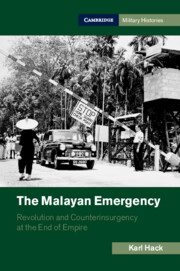Book contents
- The Malayan Emergency
- Cambridge Military Histories
- The Malayan Emergency
- Copyright page
- Contents
- Figures
- Maps
- Tables and Charts
- Preface and Acknowledgements
- Note On the Text: Language, Terminology and Measures
- Abbreviations
- Additional material
- 1 Introduction and Overview
- 2 Fatal Decisions
- 3 Terror, Counter-Terror and Pressure
- 4 Bureaucratic Counter-Terror and MNLA Main Forces
- 5 The Briggs Plan
- 6 Chin Peng and Communist Plans
- 7 Templer
- 8 Optimising Counterinsurgency
- 9 Politics, Decolonisation and Counterinsurgency
- 10 Conclusion
- Appendix 1 Emergency Statistics, 1948 to 1960
- Appendix 2 The Second Emergency, 1968 to 1989
- Glossary
- Bibliography
- Index
5 - The Briggs Plan
March 1950 to November 1951
Published online by Cambridge University Press: 16 December 2021
- The Malayan Emergency
- Cambridge Military Histories
- The Malayan Emergency
- Copyright page
- Contents
- Figures
- Maps
- Tables and Charts
- Preface and Acknowledgements
- Note On the Text: Language, Terminology and Measures
- Abbreviations
- Additional material
- 1 Introduction and Overview
- 2 Fatal Decisions
- 3 Terror, Counter-Terror and Pressure
- 4 Bureaucratic Counter-Terror and MNLA Main Forces
- 5 The Briggs Plan
- 6 Chin Peng and Communist Plans
- 7 Templer
- 8 Optimising Counterinsurgency
- 9 Politics, Decolonisation and Counterinsurgency
- 10 Conclusion
- Appendix 1 Emergency Statistics, 1948 to 1960
- Appendix 2 The Second Emergency, 1968 to 1989
- Glossary
- Bibliography
- Index
Summary
The Briggs Plan is well known, but this chapter shows it instituted much more than a civil–military executive committee system and ‘population control’ through resettlement. Instead it aimed at a broader ‘geodemographic’ control of people and space, including ‘things’ such as food. It intended this to variously weaken insurgent–rural population links, provide ‘cover’ for the popultion to refuse what insurgents asked of them and create killing grounds as it forced insurgents to approach resettlements in more predictble ways. This chapter shows multiple individuals threatening resignation as the staggering scale of the plan – over 1 million were moved – tested people to the limit. It ends with promising signs but also still-high incident levels and rising concern in the wake of the killing of the high commissioner, Sir Henry Gurney, in October 1951. It also reminds us that even as geodemographic control was tightening and the first amenities for the resettled appearing, Briggs’s idea of clearing successive area was going nowhere. The operations were just too short, and too short of covering entire communist committee districts, to stop the MCP regenerating afterwards.
Keywords
- Type
- Chapter
- Information
- The Malayan EmergencyRevolution and Counterinsurgency at the End of Empire, pp. 191 - 246Publisher: Cambridge University PressPrint publication year: 2021

